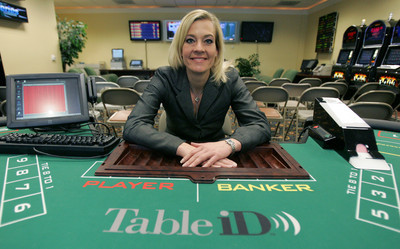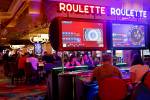Gaming executive steers company through transformation
Heather Rollo graduated from the ski slopes of Utah to the bright lights of Las Vegas. Now, she's mixing with the financial mavens of Wall Street.
As chief financial officer for Progressive Gaming International, the 34-year-old has helped steer the Las Vegas-based company's transformation from a gambling equipment provider to a technology operation that services casinos.
The road has not always been smooth.
Progressive Gaming's stock price fell roughly 75 percent in 2007, erasing more than $200 million in market capitalization. The company sold off both its slot machine division and table games operation last year to focus solely on technology. Progressive Gaming, formerly known as Mikohn Gaming, also settled a decades-old federal antitrust lawsuit.
The company now sells slot-machine and table-game management systems, and has a line of poker and sports wagering products. A recent investors report by Wall Street's Goldman Sachs says Progressive's products are gaining in the market.
"We streamlined the business and that allowed us to focus on three areas as opposed to having four, five or six different things to focus on," Rollo said.
Rollo moved to Las Vegas in 1996 after graduating from Southern Utah State University. She joined Progressive (ticker: PGIC, Nasdaq National Market) in 2005 as the chief accounting officer. A year later, she became CFO. Rollo is one of Progressive Gaming's top executives, along with Chief Executive Officer and President Russ McMeekin.
During her tenure, Progressive's transformation has included the acquisition of technology operations from the United Kingdom and Australia, in addition to the sales of certain divisions. Along the way, Rollo had to restructure Progressive Gaming's balance sheet.
Question: Why did you move to Las Vegas?
Answer: Las Vegas was a good fit because it was close to my hometown and was well known to me through my frequent visits. It also offered great career opportunities because of the growth and dynamic nature of the gaming industry. I was introduced to gaming through my work in public accounting and have spent over 10 years working with both the operator and supplier side.
Question: What type of challenges have you faced during the company's transition?
Answer: Russ came in and we determined the company would change from what was a manufacturer of signs, slot machines and table games to a systems technology company. We bought technology companies and we sold off our different divisions. That entailed a lot of changes with people and processes. The biggest challenge has been doing all that in a regulated and publicly traded company environment.
Question: Was it a hard decision to get out of the slot machine manufacturing business?
Answer: The company is relatively small with just fewer than 300 employees. We have a number of people with a technology background and it gave us an opportunity to leverage the intellectual property and existing technology with our own people. We serve a niche market instead of trying to compete head-on with full-scale manufacturing companies.
Question: What are some of Progressive Gaming's core products?
Answer: We've developed a competence for gaming systems, providing the technologies for the casino. We have had a strong international presence, too. Progressive and (International Game Technology) both have software systems, patents and intellectual property for RFID (radio frequency identification), and we've collaborated and jointly sell and market this technology.
We also manage more than 75,000 slot machines via our central slot management system worldwide and expect to be a leader in the sports and poker management system segment within the next 24 months.
Question: How widely used are RFID chips and the related systems?
Answer: It depends on the geographic location. In Macau, which has a large table-game market, a large number of chips are used and casinos deploy systems primarily for protection. In the United States, our customers, for example in the Midwest, use the RFID technology for better player marketing. The science behind slot marketing has never been used for table games and RFID allows for this science to be used for more accountability.
We have properties in Las Vegas, California, Arizona and soon the East Coast coming on line. We expect to have our first European casino using RFID in the second half of this year.
Question: Is it hard to get casino patrons to accept new technology?
Answer: The implementation of ticket in-ticket out technology proved there is definitely an adoption curve in the gaming industry. Regulations can slow the implementation process in general but in terms of customers or patrons, I don't believe there is any resistance or reluctance to new casino technology.
Question: How involved is Progressive Gaming with server-based gaming?
Answer: We have our own customers on the slot-machine management side and we certainly will be ready primarily in international markets. Our focus is on our existing installed base to make sure our casino management system fits for those who intend to use Gaming Standards Association-ready server-based technology.
Question: How long did it take to understand the gaming industry?
Answer: I worked in accounting, auditing and consulting for casino companies and casino suppliers in the United States and overseas. When I started as CFO at Progressive, I went through a steep learning curve but it was a good experience. We've seen good traction in our business over the last couple of quarters and we're excited about our future opportunities for expansion all over the world. We believe Europe and Canada will be big markets for us, as well as Asia and Australia for slot management, and U.S. and Macau for table management.
Question: How much of your time is spent handling investor relations?
Answer: I do this in collaboration with Russ. That's a routine part of everyone's business.
We have particular times of the year when we spend a lot of our focus on investors and with analysts. The change in the company's direction required us to spend more time with people so they could understand where the company was going.
Question: What is your answer to investors who ask about Progressive Gaming's stock price?
Answer: Our job is focused on the business execution and the growth of revenues and how that translates to the business. We're not stock experts nor do we give advice on the stock. We have a small management group, and that's helpful. It keeps for good communication and gives us the ability to be on the same page. We're flexible and, as a small business, we can react quickly when something comes up. We have dealt with many external issues dealing with legacy debt and legal issues.
Contact reporter Howard Stutz at hstutz@reviewjournal.com or 702-477-3871.
VITAL STATISTICS Name: Heather Rollo. Age: 34. Position: Executive vice president and chief financial officer, Progressive Gaming International. Family: Parents and three younger brothers live in Cedar City, Utah. Education: Master of accountancy and bachelor's degree in business administration from Southern Utah State University. Work history: Progressive Gaming International, 2005 to present, served as chief accounting officer and then chief financial officer; financial executive at Ameristar Casinos; auditor and consultant at accounting firms Arthur Andersen, Deloitte & Touche and Ernst & Young. Hobbies: Traveling, skiing, running, spending time with my family. Favorite book: "The Seven Habits of Highly Effective People," by Stephen Covey. Hometown: Cedar City, Utah. In Las Vegas since: 1996. Quotable: "Las Vegas was a good fit because it was close to my hometown and was well known to me through my frequent visits. It also offered great career opportunities because of the growth and dynamic nature of the industry." Progressive Gaming International is at 920 Pilot Road and can be reached at 702-896-3890.




























